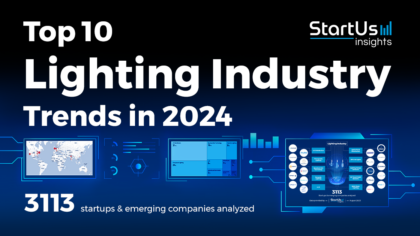The 2025 Manufacturing Industry Outlook analyzes the global manufacturing sector, highlighting its transformation through advanced technologies, sustainability initiatives, and evolving market demands.
The report examines key trends, including the adoption of Industry 4.0 principles like automation, robotics, and IoT, which streamline production processes and enable real-time monitoring.
Additive manufacturing and digital twins reshape design and prototyping, while advancements in AI and machine learning drive predictive maintenance and decision-making.
The report explores market trends, technological advancements, and innovative startups to offer insights into how the manufacturing industry evolves to meet global demands and build a more resilient, sustainable future.
Executive Summary: Manufacturing Sector Outlook 2025
- Industry Growth Overview: The manufacturing industry includes over 161 000 companies and 17 000 startups. Industry growth declined by 1.41% last year, reflecting transformation challenges. However, the global manufacturing market size was USD 13.5 trillion in 2023 and USD 14.16 trillion in 2024. By 2031, it is projected to reach USD 20.76 trillion, with a compound annual growth rate (CAGR) of 4.9%.
- Manpower & Employment Growth: The manufacturing sector employs 12.3 million individuals globally and added 498 000 new employees last year, showing steady workforce expansion.
- Patents & Grants: The industry demonstrates innovation with over 1 107 000 patents and 15 000 grants, showcasing technological and research advancements.
- Global Footprint: Key country hubs include the USA, India, the UK, China, and Germany. Leading city hubs are Shenzhen, Mumbai, New York City, London, and Bangalore.
- Investment Landscape: The manufacturing sector secured over 29 000 funding rounds, supported by 17 000 investors. The average investment per round is USD 32.1 million, indicating strong financial backing.
- Top Investors: Prominent investors have a combined investment value exceeding USD 10 billion, led by the European Investment Bank, BNP Paribas, UniCredit, and more.
- Startup Ecosystem: Five innovative startups driving industry transformation are Armtronix IoT (IoT-based automation systems), Machina Labs (AI-driven agile manufacturing), Enable Manufacturing (metal 3D printing), Virspatial (spatial digital twins), and TracXon (circular hybrid printed electronics).
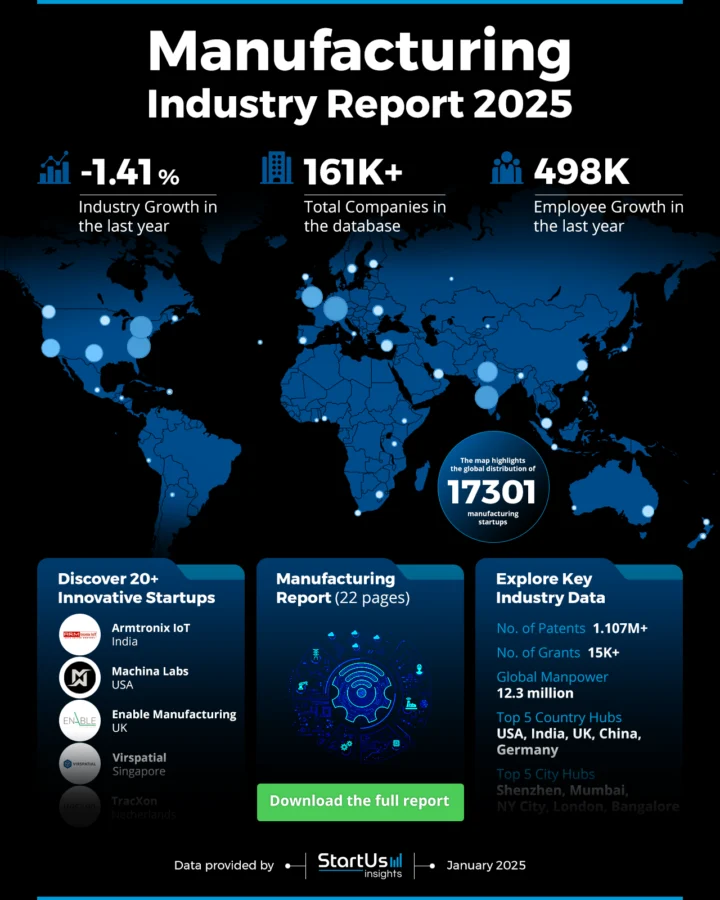
What Data is Used to Create This Manufacturing Market Report?
- News Coverage & Publications: The manufacturing industry recorded over 190 000 publications last year. This reflects high media coverage and scholarly attention.
- Funding Rounds: Our database shows the industry conducted over 29 000 funding rounds, highlighting strong financial activity and investment interest.
- Manpower: With a workforce of over 12.3 million, the manufacturing sector added 498 000 new employees last year.
- Patents: The industry has over 1 107 000 patents, emphasizing its focus on innovation and intellectual property development.
- Grants: A total of 15 000 grants support research and development efforts across the sector.
- Yearly Global Search Growth: The yearly global search growth for manufacturing reached 5.98%, indicating increasing online interest and awareness.
Methodology: How We Created This Manufacturing Report
This report is based on proprietary data from our AI-powered StartUs Insights Discovery Platform, which tracks 25 million companies and 20 000 technologies and trends globally, including detailed insights on approximately 5 million startups, scaleups, and tech companies. Leveraging this extensive database, we provide actionable insights on emerging technologies and market trends.
For this report, we focused on the evolution of manufacturing over the past 5 years, utilizing our platform’s trend intelligence feature. Key data points analyzed include:
- Total Companies working on the trend
- News Coverage and Annual Growth
- Market Maturity and Patents
- Global Search Volume & Growth
- Funding Activity and Top Countries
- Subtrends within the manufacturing industry
Our data is refreshed regularly, enabling trend comparisons for deeper insights into their relative impact and importance.
Additionally, we reviewed external resources to supplement our findings with broader market data and predictions, ensuring a reliable and comprehensive overview of the manufacturing market.
Explore the Data-driven Manufacturing Market Report for 2025
Did you know for every USD 1 spent in manufacturing, an additional USD 2.60–USD 2.69 is added to the economy, making it the sector with the highest economic multiplier effect?
The heatmap presents the manufacturing sector’s current landscape and key metrics. With over 17,000 startups and 161,000 companies, the sector represents significant economic activity. However, as per our platform data, the industry growth declined by 1.41% last year, indicating ongoing challenges.
Mordor Intelligence estimates that the smart manufacturing market size will be USD 162.00 billion in 2025. It is projected to reach USD 319.94 billion by 2030, with a CAGR of 14.58% during the 2025-2030 period.
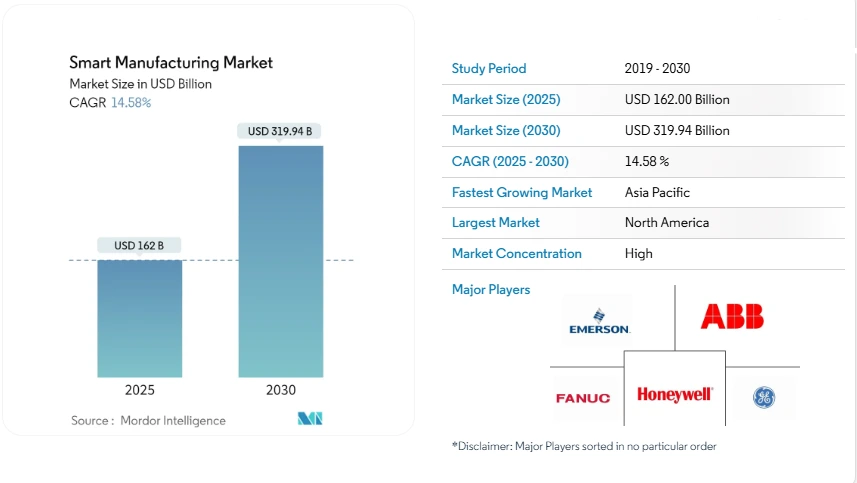
Credit: Mordor Intelligence
The industry has a strong innovation pipeline, with 1 107,000 patents and 15 000 grants. The manufacturing sector employs 12.3 million people globally, with an employee growth of 498 000 last year. This reflects industry adaptability and regional opportunities.
Key geographic hubs include the USA, India, UK, China, and Germany, showcasing global distribution. Leading city hubs such as Shenzhen, Mumbai, New York City, London, and Bangalore highlight regional dynamics and labor trends.
Asia-Pacific region leads in smart manufacturing adoption, accounting for 37% of the global market share in 2024. Its smart manufacturing market is projected to grow from USD 130.69 billion in 2025 to USD 497 billion by 2034 at a CAGR of 16.2%.
A Snapshot of the Global Manufacturing Market
The manufacturing industry includes over 17 000 startups, with 3100 classified as early-stage and more than 8200 involved in mergers and acquisitions. This indicates dynamic entrepreneurial activity and consolidation.
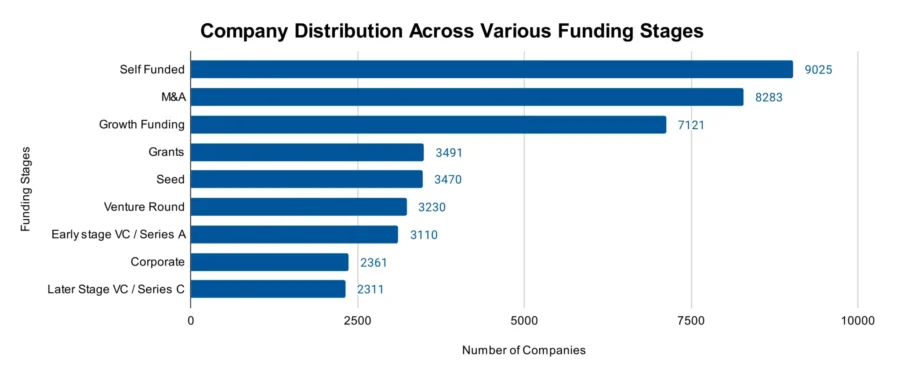
Despite a slight annual growth decline of 1.41%, innovation remains a core focus. The industry holds over 1,107,000 patents, submitted by more than 15,000 applicants. Yearly patent growth is 0.56%, reflecting steady technological advancements.
China and the USA lead in patent issuance, with 300,000 and 229,000 patents respectively. These figures highlight the dominance of these regions in driving technological progress in manufacturing.
Explore the Funding Landscape of the Manufacturing Market
The manufacturing industry shows strong investment activity, with an average of USD 32.1 million per funding round. This highlights significant financial commitments from stakeholders to support growth.
Over 17 000 investors have participated in more than 29 000 funding rounds, demonstrating broad financial engagement. These investments have reached over 12 000 companies, which indicates widespread capital distribution across the sector.
This investment ecosystem fosters innovation, scales operations, and addresses challenges, positioning manufacturing as a vital industry within the global economy.
Who is Investing in the Compliance Management Market?
The top investors in the manufacturing industry have invested over USD 10 billion, reflecting strong financial support for innovation and growth.
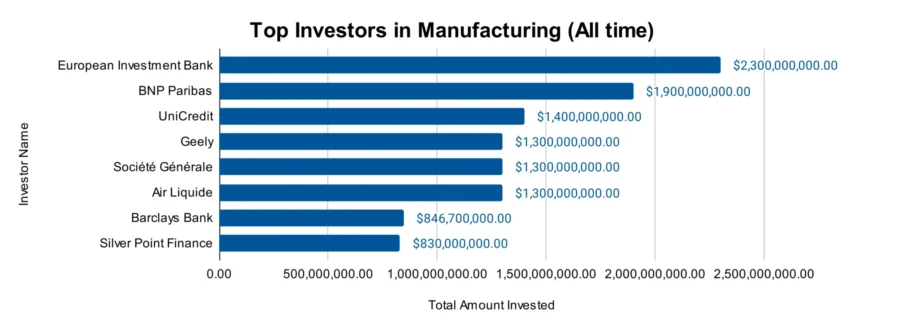
- The European Investment Bank has invested USD 2.3 billion across 14 companies.
- BNP Paribas contributed USD 1.9 billion, targeting 14 companies.
- UniCredit invested USD 1.4 billion in 8 companies.
- Geely allocated USD 1.3 billion across 5 companies.
- Société Générale also invested USD 1.3 billion in 5 companies.
- Air Liquide invested USD 1.3 billion in 4 companies. It announced an investment of over USD 250 million to build a new industrial gas production facility in Idaho, USA.
- Barclays Bank provided USD 846.7 million in funding to 7 companies. It advocates for investment zones in the UK to support advanced manufacturing. These zones provide fiscal incentives like capital allowances and business rate relief to encourage manufacturers to grow and innovate
- Silver Point Finance invested USD 830 million in 2 companies.
Top Manufacturing Innovations & Trends with the Discovery Platform
The manufacturing industry is shaped by key trends driving innovation and operational transformation. Below is an analysis of the top three trends with their respective firmographic data:
- Sustainable Manufacturing: This trend includes 2800 companies employing 312 000 people globally. The sector added 17 000 new employees last year, reflecting moderate growth. An annual growth rate of 2.60% indicates steady adoption of sustainable practices.
- Manufacturing Automation Systems: With 1800 companies identified, this sector employs 106 000 individuals, adding 5000 new employees last year. The annual growth rate of 20.82% reflects the rapid integration of automation technologies for efficiency and precision.
- Industrial 3D Printing: This emerging trend includes 800 companies with 26 000 employees and 2000 new hires last year. Further, an annual growth rate of 13.99% underscores increasing adoption for prototyping and production.
5 Top Examples from 17000+ Innovative Manufacturing Startups
The five innovative startups showcased below are picked based on data including the trend they operate within and their relevance, founding year, funding status, and more. Book a demo to find promising startups, emerging trends, or industry data specific to your company’s needs and objectives.
Armtronix IoT develops IoT-based Automation System
Indian startup Armtronix IoT builds industrial automation solutions using devices like the Master Control Unit (MCU) and Retro to IIoT. These devices execute control logic like programmable logic controllers (PLCs) but are programmed via a web browser to eliminate the need for licensed software.
The MCU receives data from sensors, user inputs, and pre-programmed procedures, processes this data, and stores it in a local database for analysis. It also sends commands to data acquisition and edge control devices for monitoring and controlling end equipment.
The MCU integrates Node-RED, an IoT tool that facilitates data collection from sensors and provides a graphical user interface for equipment monitoring and control.
The startup’s modular I/O devices allow users to customize I/O configurations by coupling up to three I/O modules in various combinations, enhancing system flexibility. Armtronix IoT promotes efficient and cost-effective industrial automation by offering web-programmable controllers and modular I/O expansion.
Machina Labs offers an Agile Manufacturing Platform
US-based startup Machina Labs makes manufacturing platforms that integrate AI and robotics to create software-defined factories.
Its Robotic Craftsman platform employs 7-axis robots with interchangeable tools and sensors for operations like Roboforming, Roboscanning, and Robotrimming on various materials. Roboforming uses precise industrial robotics and AI-driven process control to shape sheet metal into large, complex parts without custom tooling.
Roboscanning employs robot-mounted laser scanners to create 3D maps of part surfaces, enabling real-time accuracy assessments against CAD models. Robotrimming involves robots manipulating cutting tools to trim and drill parts with high precision.
Machina Labs eliminates custom tooling and enables rapid iteration to accelerate design and production processes. This offers manufacturers a flexible and efficient solution for producing complex parts.
Enable Manufacturing specializes in Metal 3D Printing
UK-based startup Enable Manufacturing develops Additive Casting, combining 3D printing and traditional casting to produce complex metal parts. It uses 3D printing to create molds and patterns, then casts parts in over 130 different metals.
This method eliminates the need for tooling, which allows for complex parts to be manufactured from the first prototype to large production volumes.
Enable Manufacturing provides a flexible and cost-effective solution for producing complex metal parts across various industries.
Virspatial creates Spatial Digital Twins
Singaporean startup Virspatial develops spatial digital twin solutions for enterprise metaverse applications. Its Twinverse platform creates digital replicas of physical assets, spaces, or operations that allow users to perform tasks digitally before executing them physically.
The platform supports cloud-agnostic deployment, multi-source data fusion, and cross-platform interaction, which ensures data security and compatibility with various devices.
Virspatial provides real-time visualization and situational awareness to enhance operational efficiency and decision-making across industries.
TracXon focuses on Circular Manufacturing
Dutch startup TracXon creates hybrid printed electronics using sheet-to-sheet (S2S) and roll-to-roll (R2R) printing with component assembly. This process combines printing techniques with electronic component placement to make flexible electronic products.
It allows the creation of ultra-thin, large-area circuits on flexible substrates for healthcare, automotive, and consumer electronics.
TracXon removes the need for traditional circuit boards and provides a cost-effective, sustainable way to manufacture electronic devices.
Gain Comprehensive Insights into Manufacturing Trends, Startups, or Technologies
The 2025 manufacturing industry shows resilience despite challenges, with innovation driven by sustainable practices, automation systems, and industrial 3D printing.
Emerging trends like digital twins, AI-driven processes, and circular manufacturing are reshaping operational efficiency and environmental impact.
The industry’s future depends on integrating advanced technologies to optimize productivity, reduce waste, and meet evolving global demands.
Get in touch to explore all 17000+ startups and scaleups, as well as all market trends impacting manufacturing companies.





